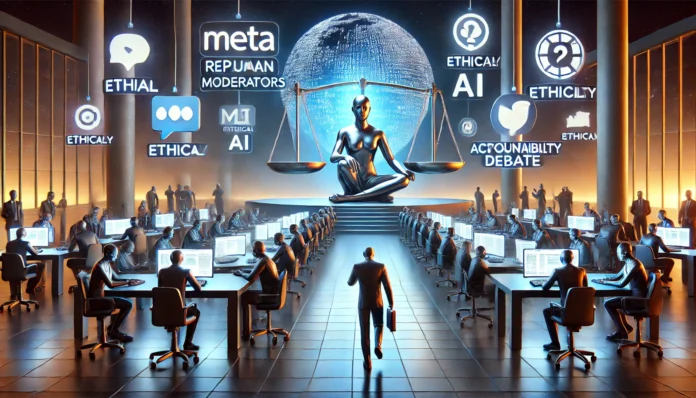Meta, the parent company of Facebook, has ignited a worldwide debate with its recent decision to phase out thousands of human content moderators and replace them with advanced AI systems. This sweeping transition, announced in early June 2025, marks one of the most significant shifts in digital content governance to date and raises urgent questions about ethics, transparency, and the future of online discourse.
The End of Human Moderation?
For years, Meta has relied on a vast network of human moderators to police content across its social platforms, balancing the demands of free expression with the need to curb hate speech, misinformation, and abuse. The new strategy will see these roles largely automated, with AI models taking over the bulk of moderation tasks—an approach that promises greater efficiency and scalability, especially as user-generated content volumes continue to soar4.
However, this move has sparked widespread concern among experts, civil society, and users. Critics warn that AI, despite its advances, still struggles with context, nuance, and cultural sensitivity—factors that are crucial in determining whether content is harmful or benign. Automated systems can inadvertently reinforce biases, fail to understand local languages and customs, and make opaque decisions that are difficult to appeal.
Efficiency vs. Ethics: The Core Dilemma
Meta’s decision is emblematic of a broader trend in the tech industry, where AI and machine learning are increasingly being deployed to tackle complex, labor-intensive tasks. Proponents argue that automation can reduce costs, improve consistency, and handle the sheer scale of modern social platforms. Yet, as the volume of content grows, so does the risk of error and the potential for AI to perpetuate systemic biases.
Transparency and accountability are at the heart of the debate. When AI moderates content, users often have little insight into why their posts are removed or flagged. The appeals process becomes more convoluted, and the lack of a human touch can erode trust in the platform’s governance.
Global Impact: Cultural and Legal Complexities
Meta’s platforms serve billions of users worldwide, each with unique linguistic, cultural, and legal contexts. AI moderation tools, often trained on data from dominant languages and cultures, risk applying one-size-fits-all standards that may not reflect local realities. Without careful localization and oversight, this could exacerbate existing inequalities and marginalize vulnerable communities.
The move also raises questions about compliance with regional regulations, such as the European Union’s Digital Services Act, which mandates transparency and accountability in content moderation. Meta’s reliance on AI will be closely scrutinized by regulators and watchdogs seeking to ensure that automated systems do not undermine user rights or democratic values.
What’s Next for Digital Content Moderation?
As Meta pioneers this new era of AI-driven moderation, the tech industry and society at large are watching closely. Striking the right balance between efficiency, fairness, and sensitivity will be a defining challenge for years to come. Experts call for robust oversight, regular audits, and the retention of some human moderators to handle complex or sensitive cases.
Ultimately, Meta’s gamble could set a precedent for other platforms. Whether it leads to a safer, more equitable digital world—or amplifies the very problems it seeks to solve—will depend on how thoughtfully AI is deployed and governed.




